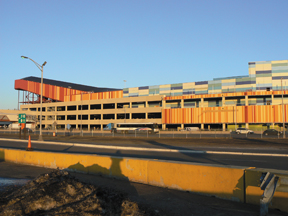With thousands of known contaminated sites in New Jersey, cleaning them up for development or transportation projects can take years. As a result, the state Department of Environmental Protection (DEP) may soon be able to give the duty of inspecting contaminated sites to private contractors.
As it is now, caseworkers at the DEP must inspect and approve environmental remediation work at every site, which critics claim creates huge backlogs in a state that has more toxic sites than any other in the nation.
“There are 20,000 known contaminated sites in New Jersey, well beyond what could get cleaned up in a reasonable timeframe,” said Assemblyman John McKeon (27th Dist.), a co-sponsor of recent legislation allowing the DEP to transfer the work to private inspectors. “The DEP has gone from 3,500 employees to 3,000, with about 115 caseworkers at the agency who oversee environmental clean-up. So the estimate is that it would take seven to 10 years to clean up sites at the rate we’ve been going.”
Under the legislation, which passed both chambers of the Assembly last Monday, the inspection of environmental clean-up work will shift to independent engineering firms that already do remediation work.
The DEP will still audit at least 10 percent of remediated sites every year. In addition, a new 13-member licensing board will be created to ensure engineering companies aren’t certifying shoddy work.
“This is a public-private partnership where licensed engineers, who have experience with site remediation, will evaluate projects and certify that they’ve been cleaned up in a professional way,” said McKeon, who modeled the legislation on a similar one passed in Massachusetts 13 years ago.
“Precious little environmental clean up gets done in New Jersey.” – Captain Bill Sheehan
________
Backed by Riverkeeper
Many in the environmental community back the measure.
“Precious little environmental clean-up gets done in New Jersey. And what gets done doesn’t always get done to the highest standard,” said Hackensack Riverkeeper Captain Bill Sheehan, who lives in Secaucus.
“It’s not because DEP is bad or that the people there can’t do the job,” he said. “It’s just that workers there are overwhelmed by the caseload. By privatizing site remediation, we can get a lot of those 20,000 contaminated sites off the contamination list. That’s something we wholeheartedly support.”
In addition, Sheehan said that high turnover among DEP caseworkers can lead to disjointed, non-comprehensive environmental clean-up at some development sites. In January, it was reported that developers at the Xanadu recreation/retail complex in East Rutherford had uncovered a number of rusted out, oozing steel drums underground.
Sheehan said Xanadu developers chose to do “piecemeal remediation. That is, they cleaned and replaced contaminated soil as they uncovered it. But everyone knew what was under the [Meadowlands Sport Complex] parking lot. That land used to be a dumping ground for industrial waste, truck oil, cast-off household items. I would have preferred that they did a more comprehensive clean-up, to make sure the found everything that was there.”
There wasn’t anything inherently wrong with the type of clean-up that was done at Xanadu, Sheehan acknowledged, especially since the site will be used for short-term entertainment, not housing.
Sheehan believes site remediation will be more comprehensive and better planned under the legislation.
Train tunnel
One project that may benefit from the legislation is the cleanup around the New Jersey portion of a new train tunnel to New York City. The trans-Hudson commuter rail system known as the ARC will break ground in North Bergen some time this spring.
The ARC – short for Access to the Region’s Core – will connect the Frank Lautenberg Transit Station in Secaucus to Penn Station in Manhattan. Ultimately, the $8.7 billion, six-track project is expected to double rail capacity to New York City. But engineers will first have to contend with 16 industrial toxic sites during construction of the tunnel. The new legislation may help prevent delays on the project.
Supporters of the legislation say the measure will not cost taxpayers more money.
“The legislation could actually be a benefit because the longer land lies fallow, the longer it takes to make that land useful for some purpose, and the longer it takes to get back on the tax rolls,” McKeon said.
The legislation went to Gov. Jon Corzine last week for his signature. He is expected to sign the measure.
Reach E. Assata Wright at awright@hudsonreporter.com.
